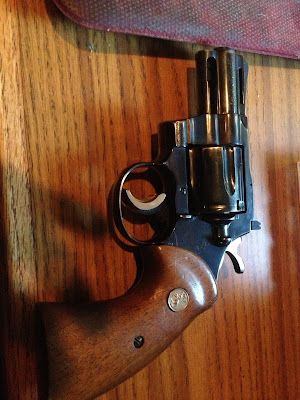_____
______________________________________________________________________________
Fiona - Hey, Doug. I guess the street lights are just popping on in the windy city.
Doug - ...and the crickets are chirping.
Fiona - I've spent a little time in Chicago - I wish it were more. Can you tell my blog-readers
how you spend your days and maybe give them a little of your background?
Doug - In reverse order... I grew up in Kansas where I went to college and worked as a deputy
sheriff for half a dozen years. I got a degree in radio-TV and had interned at a local TV
station. I was getting tired of cop work, as sometimes happens, and one night I had a
reporter from a radio station as a ride-along. He was leaving the station to go to law
school. I asked if his job had been filled, and it hadn't...so I had the perfect segue.
I ended up working at the station, and he became a deputy while in law school. I think
they make TV shows about things like that nowadays. I worked as a crime reporter in Kansas City
for two years, and then I moved to Chicago and spent fifteen years covering crime and disasters
in this area.
Fiona - Did you have to go through a police training program to be a deputy sheriff?
Doug - Yes, training is required...more now even than back then. With regular weapons qualification and
continuing education. I completed about half the work for a Masters in Criminal Justice, in fact.
Fiona - Because I have a lot of international readers, can you explain the differences between a sheriff and a
police officer?
Link to more information about sheriffs
Doug - The differences are mostly in name. Sheriff's are elected officials.
The name comes from the old English, I believe...shire-reeve. If
you remember Robin Hood...Anyway the sheriff is the chief law
enforcement officer of most counties and his deputies usually
have authority in unincorporated areas of the county.
Fiona - Shire-reeve. Now there's a fun little tid-bit of information that I
can drop at my next cocktail party.
Doug - Police officers typically patrol in cities. Having said that, some states countywide police departments
and the sheriff is relegated to administration of the jail. It depends on where you live.
In Kansas and Illinois, sheriffs are elected county officials and have police and jail administration
functions.
Fiona - So, I know that guns are near and dear to your heart. Have you ever had to use one in the line of
duty? Or for self-protection?
This is Doug's Colt Python
Doug - Thankfully, no and I hope I never get into such a situation. I was on my way to a shootout once...
but the bad guy was killed before I arrived. I appreciated the timing.
Fiona - No kidding! That must be an odd experience to have the adrenaline flowing and then know that it
was over - but badly.
Doug - It's not uncommon...I've certainly been in hairy situations that weren't diffused quickly enough for
me to avoid them.
Fiona - Okay, give me a hairy example, LOL.
Doug - Well, the hairiest was a chase and head on crash. We were chasing a couple of armed robbery
suspects (we thought), and they turned around and came back at us. It was odd to have the right,
front fender appear three inches from your head while sitting in the passenger seat.
Fiona - No kidding! YIKES! Was everyone okay?
Doug - My then partner still has back issues but other than that everyone was fine. Yep, wrecked a squad
car with only a couple of hundred miles and all new equipment tho.
Fiona - I bet that went over big with the budget office. Okay, I'm going to throw out my typical question -
what in books, TV, movies etc. do you see being portrayed incorrectly, and it ticks you off?
Doug - What annoys me most...when cops are portrayed as bumbling or stupid. While I have met some
book stupid cops, most of the people I've known in law enforcement are street smart, really care
about the work and put 100 percent into it. With 500-600 hours of basic training now, and
sometimes 40-60 hours of in service training every year, they know the business.
Fiona - But they also aren't super-heroes. No one should expect a cop to shoot a gun out of a perpetrators
hand with eagle vision. They can't take down a whole gang single-handedly. So how can a writer
write a cop correctly?
Doug - I think research can be as easy as finding a real cop in the town or area the author is writing about.
Going on ride-alongs or enrolling in a citizens police academy are good resources too. Another
thing that annoys me is when I read a book and can tell the author has done his research watching
cop shows, not talking to or even reading about real cops.
Fiona - How can you tell the difference? What is wrong in the shows that a cop would relate differently?
Doug - Cops aren't fashion models for one.
Fiona - Hahahaha! (I think they should be.)
Doug - And not every case requires chases and shootouts... but for
dramatic effect, nothing beats a good fight or shootout.
Also, seldom do you arrest someone and immediately give
them their rights. I only read folks their rights if I needed to
question them. Most often I was telling them to shut up!
Fiona - Hahahaha! Okay, Doug, at this point of the interview
you have a choice -
A) Tell me about your favorite scar
B) Tell me about your newest book - or-
C) both.
Doug - I have a tiny knife scar on the pointing finger of my left
hand.
Fiona - How did that happen?
Doug - Domestic dispute...lady swung a piece of broken glass at me.
Fiona - So, not a knife-scar a glass-scar. That sounds like a gang name. Victor Glasscar.
Doug - Ha! Writing that down as a character.
Fiona - Okay, I picked "C" for you. Tell us about your book.
Doug -
Easy Evil, yes.
Fiona - I think evil is darned easy.
Doug - You have the point of the book right there! My new
protagonist is a deputy police chief in a wealthy
Chicago suburb...he's got a checkered background as
an ATF agent. He thinks the PD job will be rubber
chickens and golf, until someone shoots a
judge and her daughter in their driveway. The task
force that's called in takes off in one direction, but
Harry Cork sees evidence that they're wrong, and the
real culprit may be a professional killer. As he follows
his theory, others die, and he discovers a money
laundering scheme run by some nasty
international thugs, and his past comes back to bite
him in the tookus.
LINK
Fiona - In the tookus no less!
Doug - Indeed
Fiona - And Reno Mc Carthy is your protagonist?
Doug - No, Reno was the lead character in the first two books...he appears in
Easy Evil, but Harry Cork
is the protagonist. Reno has a walk-on as himself.
Fiona - That was nice of you, otherwise his feelings would have been hurt. Well, Doug, thanks for
playing along. It was great chatting!
Thank you so much for stopping by. And thank you for your support. When you buy my books, you make it possible for me to continue to bring you helpful articles and keep ThrillWriting free and accessible to all.













